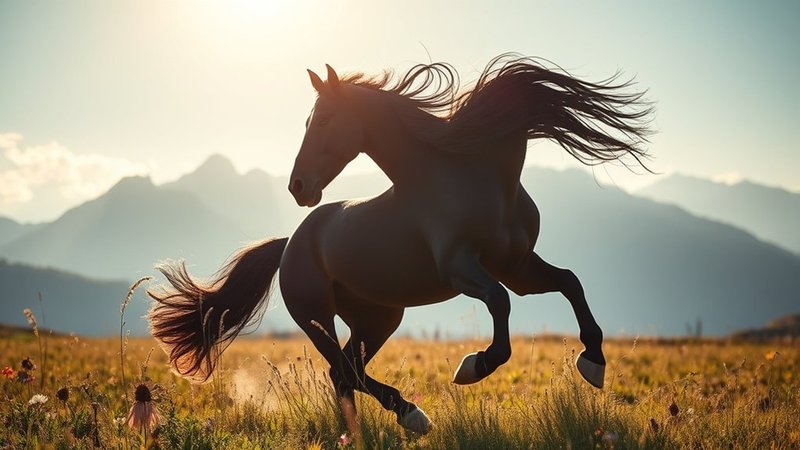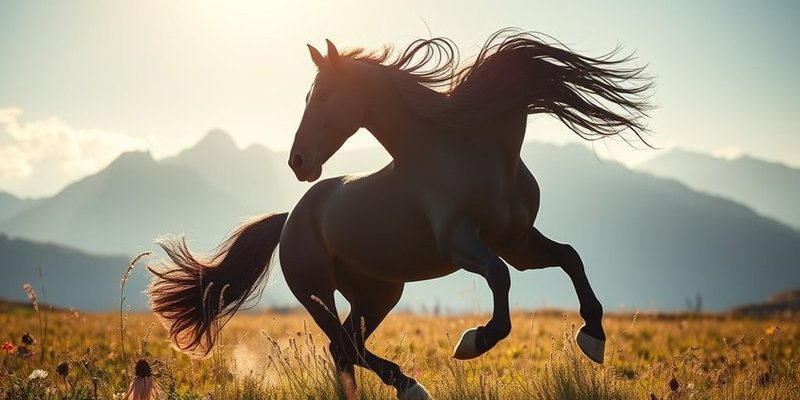
Horses are more than just animals; they embody stories, myths, and legacies. Imagine sitting around a campfire, listening to tales of brave knights and enchanted steeds. In many cultures, horses are central figures in folklore, often symbolizing not just physical power, but spiritual guidance and connection to the divine. They have inspired countless stories, legends, and even art, revealing how deeply intertwined they are with human experience.
In this article, we’ll explore the rich tapestry of how the horse is represented in culture and folklore, from ancient myths to modern-day interpretations. Whether it’s in literature, art, or oral traditions, horses have an undeniable presence in our shared human narrative.
Horses in Ancient Mythology
Horses appear prominently in ancient mythologies around the world. Let’s start with Greek mythology, where the mighty sea god Poseidon is often depicted riding a magnificent horse, showcasing their power and elegance. Here’s the thing: horses were not just for show; they represented agility and strength, symbolizing the connection between the earth and the divine.
In Norse mythology, the eight-legged horse Sleipnir is a remarkable figure. Born of the trickster god Loki, Sleipnir is said to be able to travel between worlds, reflecting the belief that horses could connect humans to the spirit realm. Similarly, in Hindu mythology, the horse is revered as the sacred vehicle of the sun god Surya. It’s fascinating to see how different cultures attribute profound meanings to these majestic creatures, often linking them to cosmic elements and divine beings.
Beyond symbolism, these mythological representations help shape our understanding of horses in society. They illustrate not just the respect humans have for these animals but also how we use them as metaphors for life’s journey and struggles. The stories we tell about horses reveal much about our values and aspirations.
Folklore and Legends
Moving beyond mythology, horses find a vibrant place in folklore across various cultures. For example, in American folklore, the story of Paul Bunyan, a giant lumberjack, often features his blue ox, Babe, but the horse is equally important, representing strength and reliability in the rugged wilderness. These tales not only entertain but serve to pass down cultural values and history.
In Celtic folklore, there are tales of the magical horse, which often appears as a guide or protector. The idea of horses possessing magical qualities resonates deeply within these stories, revealing how they can bridge the gap between the ordinary and the extraordinary. Let me explain: horses in folklore often embody traits that reflect human characteristics—loyalty, bravery, and sometimes even mischief.
You might be wondering why these stories are still popular today. Well, they remind us of our connection to nature and the wild spirit that horses embody. They also serve as a way to inspire and instill values in future generations, teaching us about courage, friendship, and adventure.
Horses in Art and Literature
Art and literature have long celebrated horses, highlighting their beauty and strength. Throughout history, artists have captured the essence of horses in paintings, sculptures, and literature. Think about famous paintings like George Stubbs’ “Whistlejacket,” which showcases a horse in all its glory, symbolizing not just physical prowess but also the elegance and grace inherent in these animals.
In literature, horses often serve as protagonists or important secondary characters. Take “Black Beauty” by Anna Sewell. This novel offers a unique perspective from the horse’s point of view, shining a light on the mistreatment of animals while celebrating their resilience and spirit. It’s a powerful reminder of the bond between humans and horses.
Moreover, horses have also inspired poetry and songs across cultures. From the galloping rhythm of a ballad to the elegant lines of a poem, horses evoke emotion and imagery that resonate with many. They symbolize freedom and adventure, often representing the untamed spirit that people long to express.
The Horse in Symbolism
Horses symbolize various concepts across different cultures. In many Native American tribes, horses symbolize power and wealth. They played an essential role in their societies, providing transportation, food, and labor. The horse was not just an animal; it was a reflection of one’s status and a connection to their heritage and beliefs.
In Eastern cultures, specifically in Chinese tradition, the horse is a symbol of success and loyalty. The Year of the Horse in the Chinese zodiac signifies energy, passion, and enthusiasm. People born in this year are often considered adventurous and hard-working, embodying the very qualities horses represent.
Interestingly, horses also appear as symbols in modern contexts. Think about the iconic image of a horse in the Olympic Games, representing not just competition but the spirit of athleticism and teamwork. The universal symbolism of horses continues to evolve while maintaining its deep connections to history and culture.
Horses in Spiritual Practices
In various cultures, horses play significant roles in spiritual practices and rituals. For instance, in some Indigenous cultures, horses are seen as sacred beings that carry the spirits of ancestors. Rituals involving horses often aim to honor these connections and seek guidance from the spirit world.
In Shamanic traditions, horses are viewed as spirit guides. Practitioners believe these animals can help individuals navigate their spiritual journeys, assisting in healing and transformation. The horse’s ability to travel between worlds symbolizes freedom and the quest for understanding.
These spiritual connections emphasize the special relationship between humans and horses. They are more than just animals; they are seen as messengers and guides, helping us connect with deeper aspects of our existence.
As we’ve explored, the horse is a powerful symbol in culture and folklore, spanning mythologies, stories, and spiritual practices. From ancient tales of divine steeds to contemporary representations of strength and freedom, horses continue to inspire and captivate us. They are woven into the fabric of our histories, reflecting our values, dreams, and the wild spirit within us.
Honestly, the horse is not just a creature of beauty; it’s a powerful emblem of our shared humanity. Their presence in culture highlights our connection to nature and the stories we tell about ourselves. So next time you see a horse, take a moment to reflect on the rich legacy they carry with them—a legacy that unites us all across time and space.

